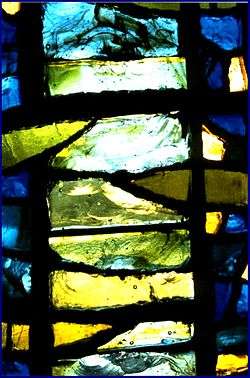Dalle de verre
Dalle de verre, from French: "glass slab", is a glass art technique that uses pieces of coloured glass set in a matrix of concrete and epoxy resin or other supporting material.
Technique
The technique was developed by Jean Gaudin in Paris in the 1930s. Slabs of coloured glass, 20 centimetres (7.9 in) to 30 centimetres (12 in) square or rectangular and typically up to 3 centimetres (1.2 in) thick, are shaped by breaking with a hammer or cutting with a saw. The edges of the resulting pieces may be chipped or faceted to increase the refraction and reflection effects.

The pieces are laid out to a design, similar to traditional stained-glass work. The pieces are laid on a bed of sand, bounded by a wooden casting frame. A matrix material, sand and cement or epoxy resin, is poured between the glass pieces and allowed to dry, typically requiring 24 hours to harden. The visible glass faces are then cleaned and the resulting solid panel can be relocated, embedded or hung as required.

The use of thicker glass produces deeper colour effects than traditional lead came stained-glass, especially when illuminated by bright natural or artificial light.[1][2]
The technique achieved prominence in the stained glass literature of the 1950s and 1960s.[3]
Problems and conservation
The resulting works may be subject to structural problems over time and, just like more traditional stained glass works, pose challenges to conservators and restorers.[3]
References
- ↑ "La dalle de verre" (in French). Retrieved 25 April 2013.
- ↑ "Dalle de Verre Technique". Retrieved 25 April 2013.
- 1 2 Bubnash, Lacey. "Dalle de Verre / Faceted Glass: New Approaches to a Modern Material" (PDF). Thesis Abstract. School of Architecture, Columbia University.